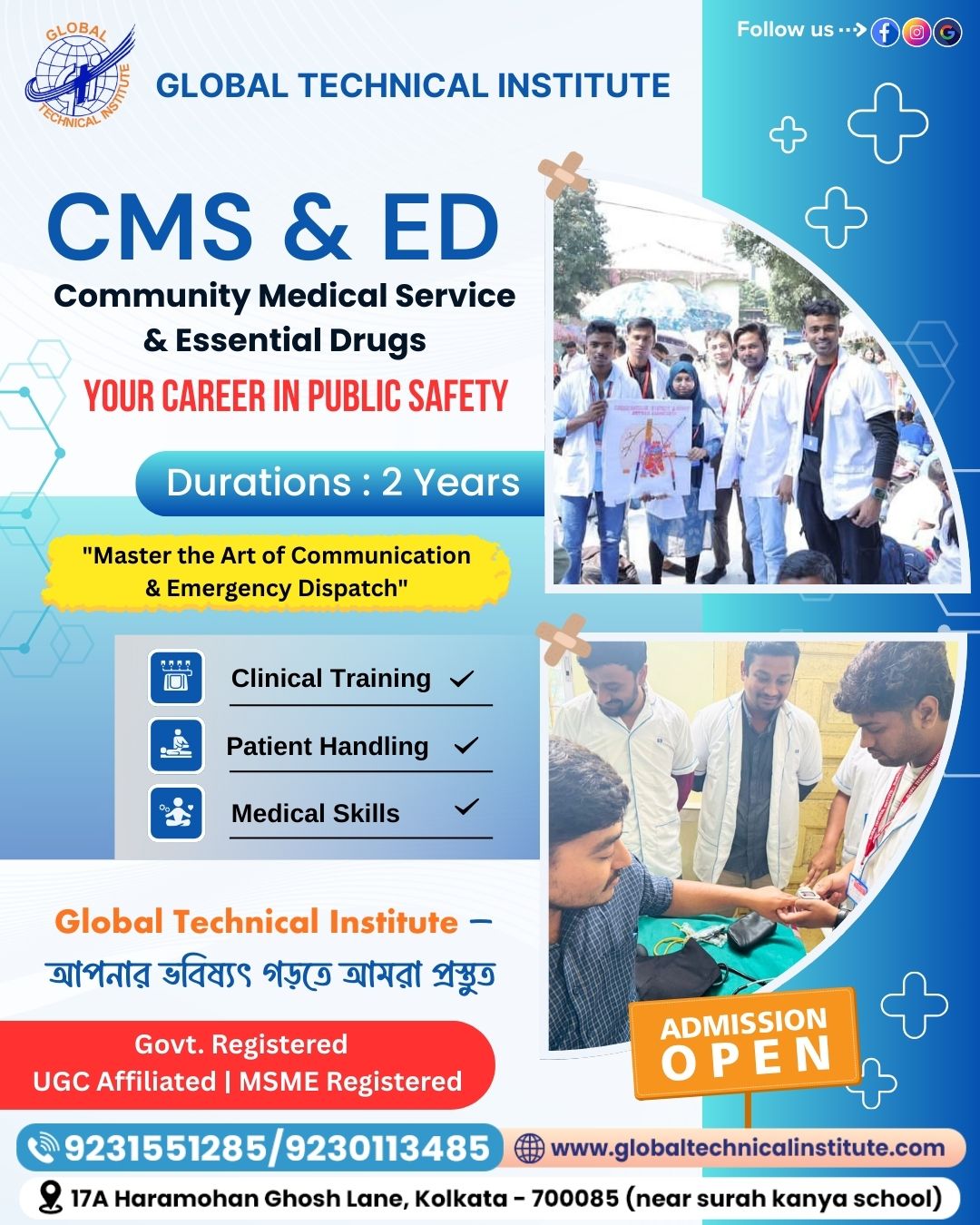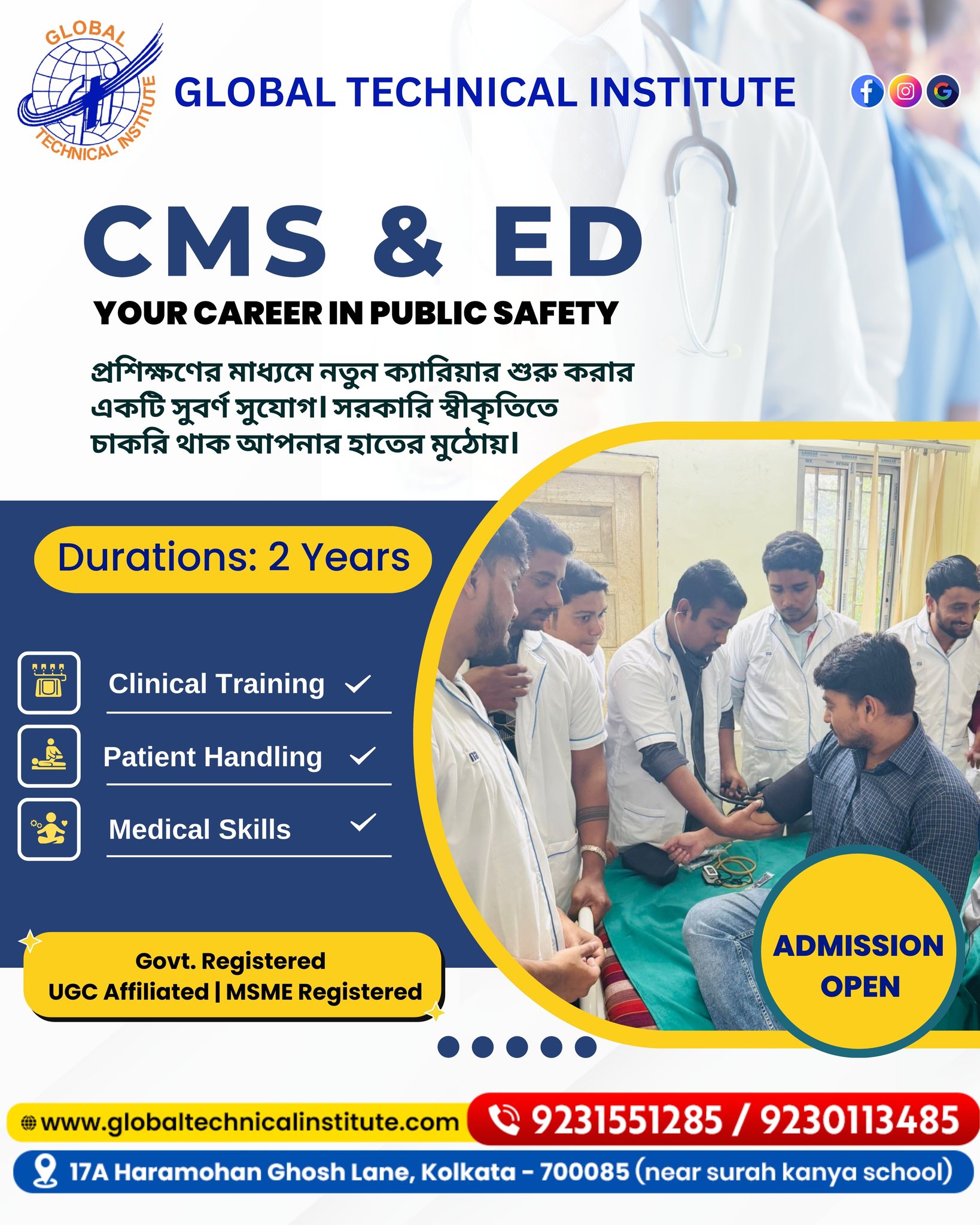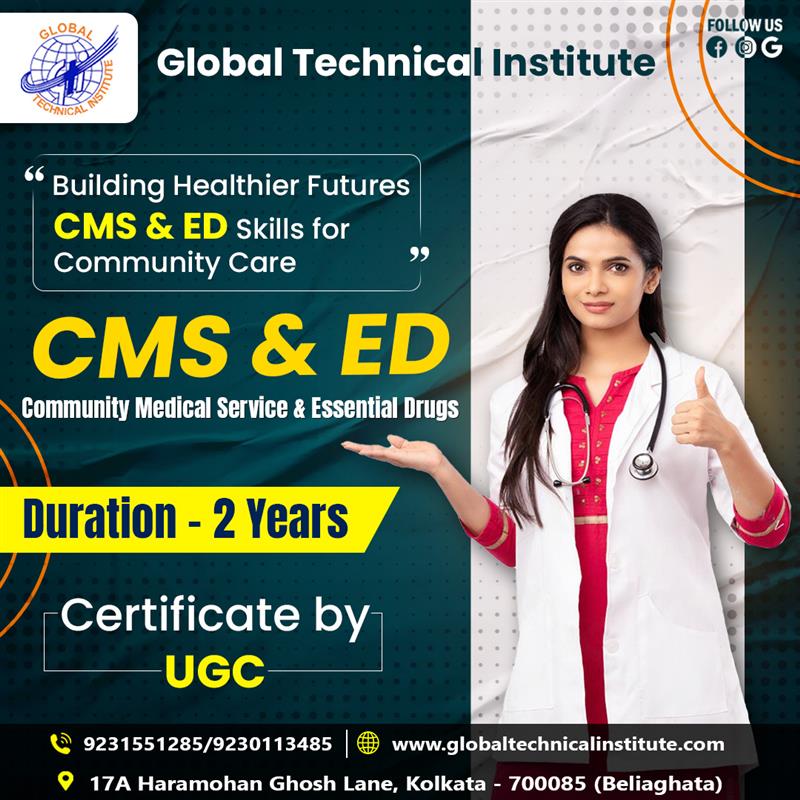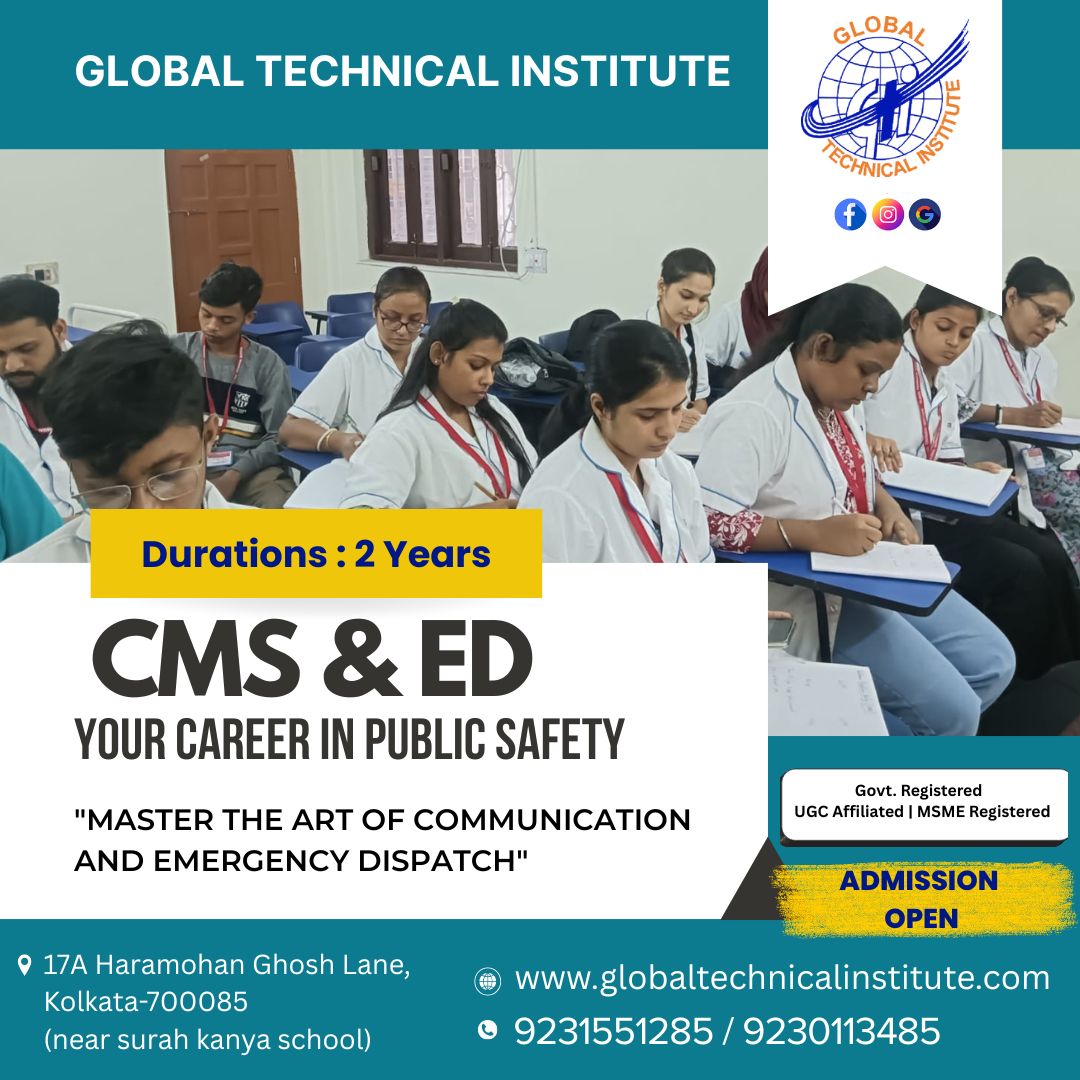Blog, CMS & ED Training in Kolkata
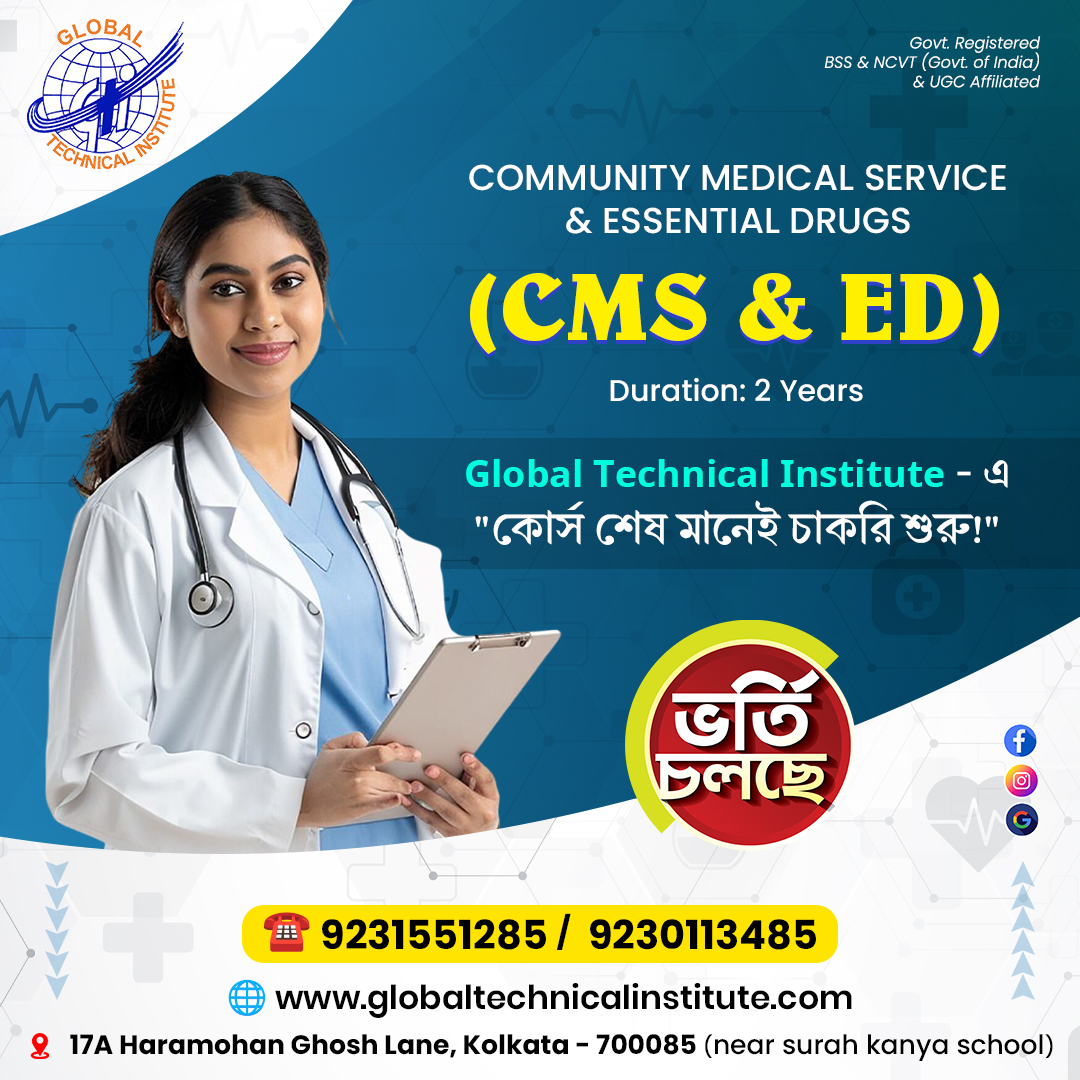
Every day in India, a child in a remote village receives life-saving immunization, a pregnant woman gets prenatal care, a diabetic patient learns to manage their condition, and a community receives education about disease prevention. These aren’t happening in gleaming multi-specialty hospitals—they’re occurring in modest primary health centers, mobile clinics, and community settings, facilitated by dedicated Community Medical Service and Essential Drugs (CMSED) professionals.
While India boasts some of the world’s finest tertiary care hospitals, the harsh reality is that millions lack access to even basic healthcare. The solution isn’t building more super-specialty hospitals—it’s strengthening primary healthcare through trained professionals who can deliver essential services at the grassroots level. This is where CMSED professionals become absolutely crucial to India’s healthcare ecosystem.
This comprehensive exploration reveals why primary healthcare is the backbone of any functional health system, the critical challenges India faces, and how CMSED-trained professionals from institutes like Global Technical Institute in Kolkata are bridging the healthcare accessibility gap.
Understanding Primary Healthcare: The Foundation of Health Systems
What is Primary Healthcare?
Primary healthcare represents the first point of contact between individuals and the health system. It encompasses:
Essential Health Services:
- Preventive care and health education
- Basic diagnosis and treatment
- Maternal and child health services
- Immunization and vaccination programs
- Management of common illnesses
- Essential drugs and medications
- Health promotion activities
- Disease surveillance and control
Core Principles:
- Accessibility: Healthcare available to all, especially underserved populations
- Affordability: Cost-effective services within community reach
- Community Participation: Local involvement in health decisions
- Appropriate Technology: Using suitable, sustainable tools and methods
- Health Promotion: Focus on prevention rather than just treatment
Why Primary Healthcare Matters
Cost-Effective: Treating diseases early at the primary level costs far less than managing complications at tertiary hospitals.
Preventive Focus: Primary healthcare emphasizes disease prevention, reducing overall disease burden.
Comprehensive Care: Addresses not just illness but social determinants of health—nutrition, sanitation, education.
Accessible: Brings healthcare to communities rather than requiring long journeys to distant hospitals.
Equity: Reduces health disparities by serving underserved populations.
Foundation for Health Security: Strong primary healthcare systems respond better to epidemics and health emergencies.
Primary Healthcare Challenges in India
Geographic Disparities
Urban-Rural Divide: While urban areas have abundant healthcare facilities, rural India (where 65% of the population lives) faces severe shortages.
Remote Accessibility: Many villages are hours away from the nearest hospital, making even basic healthcare inaccessible during emergencies.
Infrastructure Gaps: Many Primary Health Centers (PHCs) lack basic equipment, medicines, and personnel.
Human Resource Shortage
Doctor Shortage: Rural areas face acute shortages of MBBS doctors willing to serve in villages.
Specialist Unavailability: Super-specialists are virtually absent in rural healthcare.
Nurse Deficit: Even nursing staff numbers are insufficient for population needs.
Community Health Workers Gap: The critical shortage of trained community medical service professionals creates service delivery gaps.
Economic Barriers
Out-of-Pocket Expenses: Despite government schemes, healthcare costs push families into poverty.
Lost Productivity: Illness means lost income, especially devastating for daily wage workers.
Distance Costs: Travel to distant hospitals adds financial burden.
Awareness Deficits
Health Literacy: Many communities lack basic health knowledge.
Preventive Care Understanding: Limited awareness about disease prevention and health promotion.
Stigma: Social stigmas prevent people from seeking care for certain conditions.
Traditional Beliefs: Sometimes conflict with modern medical approaches.
The Critical Role of CMSED Professionals in Primary Healthcare
Bridge Between Communities and Health Systems
CMSED professionals serve as vital connectors:
Cultural Intermediaries: Understanding local languages, customs, and beliefs, they communicate healthcare information effectively.
Trust Builders: Being from or familiar with communities, they earn trust that distant doctors might not.
Accessibility Enhancers: Present where doctors aren’t, they bring healthcare to doorsteps.
System Navigators: Help community members access broader healthcare systems when needed.
Frontline Healthcare Delivery
CMSED-trained workers provide crucial services:
Basic Diagnosis and Treatment:
- Assessing common ailments
- Providing appropriate essential drugs
- Recognizing serious conditions requiring referral
- Managing chronic diseases like diabetes and hypertension
Maternal and Child Health:
- Prenatal and postnatal care
- Immunization services
- Growth monitoring
- Nutrition counseling
Disease Prevention:
- Health education campaigns
- Sanitation promotion
- Vector control programs
- Screening programs for common diseases
Emergency Response:
- First aid and basic emergency care
- Patient triage for urgent cases
- Stabilization before referral
- Disaster response
Essential Drugs Management
A critical yet often overlooked function:
Safe Medication Dispensing: CMSED professionals trained in essential drugs ensure communities receive appropriate medications safely.
Antibiotic Stewardship: Preventing antibiotic resistance through proper prescription and education.
Medication Adherence: Educating patients about completing treatment courses.
Drug Supply Management: Maintaining stocks of essential medicines at primary health centers.
Adverse Effect Monitoring: Recognizing and reporting drug reactions.
Health Documentation and Data
CMSED professionals maintain vital health information:
Patient Records: Maintaining medical documentation for continuity of care.
Disease Surveillance: Collecting data on disease patterns for public health planning.
Electronic Health Records: Operating EHR systems for digital health initiatives.
Program Monitoring: Tracking immunization coverage, maternal health indicators, etc.
This data informs public health policies and resource allocation.
Clinical Workflow Optimization
In resource-constrained primary health centers, CMSED professionals:
- Conduct patient triage to prioritize care
- Manage patient flow efficiently
- Support doctors and nurses in clinical tasks
- Ensure smooth operations despite limited resources
- Handle high patient volumes effectively
Health Education and Promotion
Beyond treatment, CMSED professionals educate communities about:
- Nutrition and healthy lifestyles
- Disease prevention strategies
- Family planning
- Sanitation and hygiene
- Early disease detection
- Mental health awareness
This education prevents diseases before they occur, reducing healthcare burden.
CMSED Professionals in National Health Programs
Ayushman Bharat – Health and Wellness Centers
India’s flagship Ayushman Bharat program aims to transform Primary Health Centers into comprehensive Health and Wellness Centers. CMSED professionals are crucial for:
- Delivering expanded service package
- Health promotion and disease prevention
- Screening for non-communicable diseases
- Managing basic healthcare needs
- Community outreach activities
National Health Mission
CMSED-trained workers support various National Health Mission programs:
Reproductive and Child Health: Maternal care, family planning, child immunization
Disease Control Programs: Tuberculosis, malaria, HIV/AIDS control initiatives
Non-Communicable Diseases: Diabetes, hypertension, cancer screening programs
Communicable Disease Surveillance: Early detection and response
COVID-19 Response
During the pandemic, community health workers proved indispensable:
- Contact tracing and surveillance
- Home isolation monitoring
- Vaccination campaign support
- Community awareness about prevention
- Mental health support
This highlighted the critical importance of strong primary healthcare infrastructure and trained personnel.
Global Technical Institute: Preparing CMSED Professionals for Primary Healthcare
Comprehensive Training Philosophy
GTI’s CMSED program is designed specifically for primary healthcare realities:
Community-Focused Curriculum: Training emphasizes skills needed in actual community settings, not just hospital environments.
Essential Drugs Training: Thorough pharmacology education ensures safe medication management.
Practical Skills: Hands-on training in patient triage, basic treatments, emergency response.
Documentation Skills: Training in record-keeping, EHR systems, and health data management.
Communication Training: Developing abilities to educate and counsel communities effectively.
Real-World Preparation
GTI ensures students experience actual primary healthcare environments:
PHC Postings: Clinical experience in Primary Health Centers
Rural Health Camps: Participating in outreach programs
Community Immersion: Understanding grassroots health challenges firsthand
Emergency Simulations: Preparing for resource-constrained crisis situations
Holistic Development
Beyond medical knowledge, GTI develops:
- Cultural sensitivity for diverse communities
- Leadership skills for health initiatives
- Problem-solving for resource-limited settings
- Team collaboration abilities
- Ethical foundations for healthcare service
Quality Assurance
GTI’s UGC-approved, ISO-certified program ensures:
- Nationally recognized qualification
- Quality education meeting standards
- Credibility with government employers
- Solid foundation for healthcare careers
Name: Global Technical Institute – CMS-ED Training Institute
Address: 17A, Hara Mohan Ghosh Ln, Phool Bagan, Beleghata, Kolkata, West Bengal 700085
Phone Number: 9230113485
Map:
Career Impact: CMSED Professionals Making a Difference
Real-World Success Stories
Deepa’s Impact: After completing CMSED training at GTI, Deepa joined a government PHC in rural West Bengal. She manages the facility’s essential drugs inventory, conducts health education sessions for pregnant women, and has helped reduce infant mortality in her service area. “GTI trained me to be self-sufficient in handling common health issues without always needing a doctor present.”
Rajesh’s Journey: Working with an NGO’s mobile health clinic, Rajesh brings primary healthcare to tribal communities. His CMSED training enables him to provide basic treatments, identify serious cases for referral, and educate communities about disease prevention. “The patient triage skills I learned at GTI help me prioritize care when we visit villages with limited time.”
Anita’s Leadership: Now coordinating a district-level immunization program, Anita credits her CMSED training for her career growth. “Understanding clinical workflows, documentation, and EHR systems at GTI prepared me for program management roles.”
The Future: Growing Importance of CMSED Professionals
Policy Recognition
Government initiatives increasingly recognize community health workers’ importance:
- Ayushman Bharat expansion requiring trained personnel
- Universal Health Coverage goals needing primary healthcare strengthening
- National Health Mission programs employing CMSED professionals
- State health departments creating new positions
Technological Integration
Primary healthcare is modernizing:
- EHR systems deployment in PHCs
- Telemedicine connecting rural areas to specialists
- Mobile health apps for community health workers
- Digital disease surveillance
CMSED professionals trained at institutes like GTI are prepared for this digital transformation.
Growing Demand
Job opportunities for CMSED graduates are expanding:
- Government PHC and CHC positions
- National Health Mission programs
- Healthcare NGOs working in underserved areas
- Corporate CSR health initiatives
- Private clinics in semi-urban areas
- Telemedicine services
- Health education roles
Salary and Security
While CMSED may not offer doctor-level salaries, it provides:
- Stable government employment (₹15,000-₹25,000+ monthly)
- Pension and benefits
- Job security
- Work-life balance
- Meaningful, impactful work
- Growth opportunities to supervisory and management roles
How You Can Contribute to India’s Primary Healthcare
If You’re Considering CMSED Training
Ask Yourself:
- Am I passionate about serving underserved communities?
- Do I want healthcare work that’s meaningful and impactful?
- Can I work effectively in resource-limited settings?
- Do I value prevention and health promotion?
- Am I willing to serve rural or semi-urban areas?
If yes, CMSED training at Global Technical Institute can transform your aspirations into reality.
Training at GTI
Eligibility: HS/12th pass from any stream
Duration: 2 years
Schedule: 1 class per week (work-friendly)
Recognition: UGC-approved, ISO-certified
Sessions: February, June, October
Investment: Affordable fees with flexible payment
Beyond Training
After CMSED qualification:
- Contribute to government health programs
- Serve with NGOs in rural healthcare
- Support national health missions
- Educate communities about health
- Manage essential drugs safely
- Be the face of healthcare for underserved populations
Conclusion: CMSED Professionals—The Unsung Heroes of Indian Healthcare
India’s healthcare future doesn’t depend solely on building more corporate hospitals or producing more super-specialists. It depends on strengthening primary healthcare—the foundation that determines health outcomes for the majority, especially the underserved.
CMSED professionals are the backbone of this primary healthcare system. They’re the health workers bringing immunizations to remote villages, managing chronic diseases in rural PHCs, educating communities about disease prevention, ensuring safe essential drugs access, and providing emergency first response in areas lacking hospitals.
These professionals may not perform complex surgeries or earn headlines, but they save more lives through prevention, early detection, and accessible care than any super-specialty hospital can.
Global Technical Institute in Kolkata is proud to prepare these healthcare heroes through comprehensive CMSED training that combines medical knowledge, practical skills, essential drugs management, and community health principles.
If India is to achieve universal health coverage and health equity, it needs thousands more trained CMSED professionals. It needs passionate individuals willing to serve where they’re needed most. It needs people who understand that the most impactful healthcare happens not in air-conditioned operation theaters, but in dusty villages, mobile clinics, and humble Primary Health Centers.
Will you be one of these healthcare heroes?
Join Global Technical Institute’s CMSED Program—Where Training Meets Purpose, and Careers Transform Communities!
Read More: Top 10 Career Paths After Completing CMSED Training
